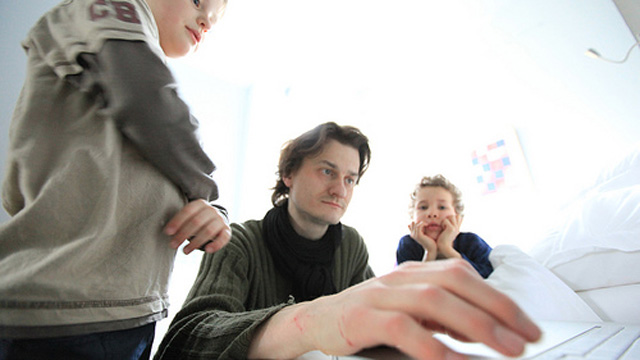By Alexis Lauricella
The world of parenting has changed. In 1980, parents had home phones without answering machines, televisions without remote controls, cars without screens, and maybe if they had older children they owned an Atari video game console. Today, toddlers tell parents to “Google it” when they can’t answer one of their million “why” questions, there are 24-hour cable channels created just for infants and toddlers, video game systems that read your body movements, and people carry mini-computers (smartphones) in their pockets that allow them to call friends, email co-workers, search the Internet, and download age-appropriate games for their child to play on the go.
The technological boom has impacted us all, but how has it influenced parents? This was the main question behind the nationally representative survey of more than 2,300 parents of children under age 8. In a report titled Parenting in the Age of Digital Technology, which was released on June 4, we examined the details and intricacies of parenting young children in an age in which technology and media are increasingly mobile, accessible, and constantly available.
This survey recognized that children spend substantial amounts of time with media including television, computers, and mobile devices and rather than focusing solely on child screen time, this survey sought to understand the role of the parents in creating the home media environment in which children are being raised today.
Three main findings from this study:
- In contrast to the popular press image that mobile technology is the new pacifier used to calm and quiet down children, our survey shows that parents today have a range of tools at their disposal and other tools are used more often than mobile technologies. Parents are more likely to use toys or activities (88%), books (79%), and TV (78%) when they need to keep children occupied than mobile media devices like smartphones or iPads (37% among those who have one).
- Parents have encyclopedias full of information at their fingertips, storybooks on their Kindles, and a selection of games in their pocket, yet for most parents media is not their number one concern, it is not something that they often have family conflict about, and most parents say new mobile devices do not make parenting easier. Fewer parents were concerned with the impact of media on their children especially compared to more global issues like health, nutrition, and social emotional skills. Most parents (70%) say smartphones and tablets do not make parenting easier. Also, media use does not cause family conflicts.
- Yes, young children spend considerable amounts of time with screen media (see Common Sense Media, 2011), but so do their parents. And it seems that parents of young children may be setting the stage for the home media environment that their young children will grow up in. Nearly 40% of families were “media centric“ families. These families have parents who themselves consume an average of 11 hours of screen media a day. Most of these parents (80%) say they are “very” or “somewhat” likely to use TV to keep their child occupied when they need to get something done at home. Many children in these families (44%) have TVs in their bedroom and children spend an average of 4.5 hours with screen media per day. In contrast, “media light” families consist of parents who spend less than two hours per day with screen media. These families enjoy watching TV or movies together as a family “a lot” and are less likely to use TV when getting their child ready for bed. Children in these families spend an hour and a half with media each day.
Yes, the world that parents parent in is different from the one in which they grew up, but the boom in mobile technology has truly become an additional tool in their parenting repertoire not their catchall solution. This generation of parents grew up with TVs, video game consoles, and some computers. They rely on the Internet, email, and mobile technology to do their work and communicate with others and they themselves are media users. Thus, their use likely sets the stage for their children’s home media environment.


